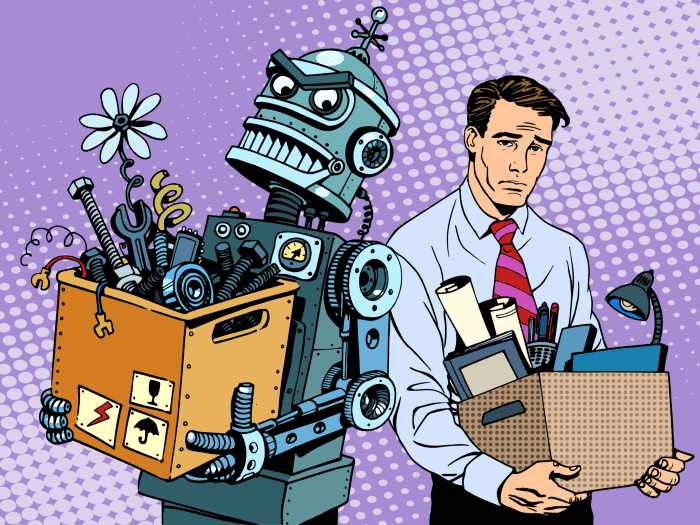
By Douglas Goldwater and Stephen Mayo
The American political system is designed to act slowly. This is largely a good thing. It provides the proper time for developments to take shape, promotes innovation and prevents governments from rapidly gaining control over our personal lives and decisions. But sometimes, technological progress overwhelms our institutions; threats to public safety and health from technology or its accidents, like epidemics, power past safeguards.
Today, artificial intelligence (AI) threatens to transform the fabric of our society, yet legislators seem curiously silent on the subject. Both progressives who are quick to regulate for social justice, and conservatives, who are quick to regulate on issues regarding social morality have proposed little on a technology whose very creators worry may one day displace millions of humans from their jobs, and replace productive human enterprise as we know it.
To be clear, the precise “threat” of AI is yet to be quantified, and some of its effects may prove supremely beneficial to humanity. But the unprecedented pace of loosely-regulated technological change could devastate humans economically as well as socially, and could even threaten our role as the leading creative species on the planet. Even pioneers and leaders in the field like Elon Musk and Chat GPT founder Sam Altman agree that unregulated AI development can bring disastrous outcomes.
So why isn’t there more public clamor for industry regulation and calls for legislative debate on the subject? Why haven’t commercial and public interest groups and lobbies, labor unions, and other organized groups of Americans called for protection from the dislocation and destruction of unhampered AI proliferation? Where are the calls to action from celebrities and the new class of “influencers?”
All these conditions are of course subject to change as quickly and radically as the technology itself. But there are some explanations as to why artificial intelligence has not become a hot button issue in our political capitals.
- Legislators are not especially knowledgeable about AI. Congress has been behind the “21st century technological times” for a long time. Legislative seniority and backgrounds betray the public interest against entrepreneurial zeal; the typical representative is 58 years old; senators 65. Chances are your representative has worked as a lobbyist, lawyer, local politician, or bureaucrat for several decades, rarely at the cutting edge of technology. Most delegate social media and webcasting tasks to young staffers. AI and other cutting edge technological developments are not always easy to comprehend and its application is thus far unaccounted to public officials charged with public welfare and safety; at least before serious damage is found.
- AI does not neatly fit traditionally partisan patterns. Democratic legislators who represent Silicon Valley-like tech centers may not want to trouble their district’s economies. Republicans traditionally wary of hampering economic or scientific “progress” may buck at checking private enterprise. Regulating AI means standing up for principles like the “work ethic,’ private labor organizations and the dignity of manual labor held by sectors once mutually antagonistic. The hope for a future utopia where all work is automated, and humans are content with a basic income of some kind may turn quite dystopian when the costs to freedom, individual autonomy and consumer choice are finally calculated, as critics increasingly sense today. Republican Teddy Roosevelt, a robust advocate of capitalism, and the crusading Progressives of the early 20th century united against the unbridled power of oil monopolies and corporate trusts. Similarly, ideological partisans today must stand up for their respective constituencies against the predatory anti-competitive nature of big tech monopolies. AI developments will be used as another tool for such companies against their competition, and small businesses and laborers will need protection from their representatives. Anyone; conservative or liberal, of the right or of the left devoted to founding principles should comprehend that any billion dollar enterprise with knowledge of your purchases, writings, or public comments online is not just another bidder for your dollar in an ordinary marketplace.
- Any AI regulation or oversight provokes the self-serving “ways and means” of legislators, lobbies, and constituencies for their own protection. Altman, the Chat GPT founder mentioned above, has recommended licensing requirements for AI creators, something that would benefit established players like himself, and would pull up the ladder for smaller startups and entrepreneurs. Companies capitalizing on AI like Google, Meta, Microsoft, Apple, and Amazon contribute to industry PACs and their employees donate huge sums to the major parties (at present, over 80% Democrat-wards). All legislators, knowledgeable about AI’s benefits and risks may have concerns about tampering with American national and regional economic advancement. The trade-offs of regulation versus laissez-faire mirror the debate about AI itself. But in considering the stakes, we all must recognize that unlike the federal and state legislative “culture wars” of late, technology, “good or bad” waits for no one.
The survival of our unique republican democracy is too important to be left to the politicians. American citizens can neither wait for politicians to act nor wait for politicians’ permission for us to act. Make AI a state and federal political agenda priority. Common cause must start between those who thoroughly disagree on many social and economic issues but thoroughly agree that democratic-republican government can only exist where humans, not robotic systems or algorithms created by corporate administrators and enabled by timid bureaucrats, decide our future.
President Lincoln stated at Gettysburg in November 1863, “Government of the people, by the people, for the people, shall not perish from the earth.” Our challenge today is to ensure that technology does not make the popular sovereignty that created it obsolete.
Douglas Goldwater; blogger and founder of “The You Frontier”: and Stephen I. Mayo attorney, business manager; co-host, the “Steve Mayo Show,” Mondays 5:30 @ WVOX radio, 1460 AM.





